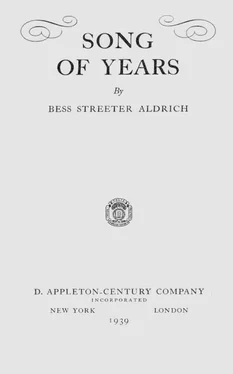1 ...6 7 8 10 11 12 ...24 At the right of the main room a huge open fireplace, through which stars were visible in the daytime, held a four-foot backlog and a wide swinging crane with iron pot. Iron shovel and tongs leaned against the wall. Wild-turkey wings, tallow candles, and snuffers were on a mantelshelf topped by crossed firearms, while another gun hung above the lintel of the lean-to door.
In the middle of the shelf stood the clock, a big Seth Thomas timepiece, on whose glass door the great American eagle encircled by thirteen stars spread his wings, held pointed darts in his claws and an E Pluribus Unum banner in his beak. Iron weights on heavy cord descended to the clock’s depths throughout the night and day, only to be wound back into place each evening by an iron key held in Jeremiah’s steady hand, at the end of which ceremony he invariably remarked: “There, now. Day’s over. Everybody gets a fresh start tomorrow.”
A walnut cupboard with plump knobs and wooden buttons for fastening its four doors was against one wall, a walnut bureau flanked another. Built-in shelves with calico curtains across them were in two of the corners, a walnut what-not filled a third, and large braided rag rugs lay on the puncheon floor.
Several chairs stood about, made from sturdy flour barrels out of which part of the staves had been sawed, the round heads inserted for seats and the whole covered with red calico. A large arm-chair held a place of honor near the fireplace while a small calico-covered rocker sat opposite it—the specific property of Jeremiah and Sarah, no one else ever sitting in them if the parents were present. A barrel-stand was near the front door, this, too, covered with bright calico, and with a removable top which formed a receptacle to hold the current pieces of sewing, while on it reposed the Bible, representing the religious life of the family, and a spy-glass, representing the earthly or non-spiritual side of existence as exemplified by the girls in trying to “make out what the neighbors were up to.” There were a few books in a corner shelf, among them an atlas, Fox’s Book of Martyrs, a volume of poems called Footprints, a New York Agricultural Report, The Indian Lover, the 1847 Parlor Annual, and The Mother’s Recompense.
On the clay-plastered whitewashed wall hung a walnut-framed steel engraving of a tomb beneath a willow, with a drooping figure in black weeping copiously with the willow but evidently sustained by the verse:
Wherefore weep o’er those who sleep?
Their precious dust the Lord will keep
Till he appear in glory here,
The harvest of the world to reap.
There were other pictures—two of former Presidents Taylor and Fillmore, good Whigs, and a third of General Winfield Scott, recently defeated Whig candidate, this political art gallery showing a fine disregard for the present democratic President Pierce. There were colored pictures of two infants, sex undetermined, one with daisies around its head labeled Day and the other with poppies titled Night, both the sleeper and its less lethargic mate surrounded by pine-cones glued to a home-made frame. Waxed autumn leaves were fastened to the walls, and several crude if colorful paintings of sprays of wild flowers were framed in shells gathered along the Red Cedar’s bank.
The room to the left contained in one end a walnut bedstead with calico valance around it and a tester of the same flowered material. In the other a dark calico curtain concealed artfully the bed that any chance company might wish to use, while another calico curtain formed a clothes-closet. In truth, calico was a prominent furnishing, almost human in its predominance of the scene.
A walnut chest of drawers stood at the east wall, a reed-basket on top held balls of carpet rags in various sizes, and in the center of the room was an unfinished rug whose connection with the colored balls was apparent.
Back in York State and later in Illinois there had been a trundle-bed in use, and although it had been years since even Suzanne’s youthful legs could curl up in the wooden boxlike affair, Sarah had insisted on bringing it out to the new home where it now reposed under the walnut bedstead (upon which she and Jeremiah nightly slept), waiting for company’s children or a potential grandchild. Unlike some of the settlers who had moved to the Valley in a single wagon, the Martins had formed a cavalcade—three big linch-pin wagons and a buckboard, drawn by three teams of horses and two yoke of oxen. It was the only way in which Sarah Martin could be budged from her obstinacy against the move, by allowing her to bring some of her cherished belongings.
Strong ladders made from hickory saplings mounted upward like open stairs into lofts above both of these log rooms. Henry and Phineas slept over the main room, sharing it with any male overnight guest. Ordinarily Celia and Suzanne slept in the bed behind the calico curtain in their parents’ room, but when company came, which was often, for never would Jeremiah Martin’s hospitality turn any one away, the two youngest of the girls climbed the ladder of saplings also and disappeared somewhere into the region above with the other five sisters. Up in these lofts the snows sometimes sifted through the log chinks onto the comforts, or little streams of water trickled in. Sometimes the night grew so cold that a few of the girls shiveringly descended the ladder, stirred the logs in the fireplace, and rolled themselves in their quilts in front of it. Sometimes the night stayed so hot under the low roof, with mosquitoes buzzing and moths flying through the open windows, that they brought their pillows down to the doorway of the main room or lean-to where it was less stifling if no less buggy.
The large lean-to, made of real sawed lumber, was the general eating and cooking part of the house now. No longer were Sarah and her daughters compelled to cook over the fireplace of the main room or in an outdoor oven. There was a four-legged stove with an elevated oven and a short hearth which protruded like a black lip forever pouting at some unknown insult. Sarah’s planning and industry had been the means of purchasing it. After the men folks had tapped the maples this year she and the girls had boiled down enough sap to make and send two tubs of maple sugar to Dubuque for it. A few things they admitted could still be cooked well over the old open flame—the big black kettle on the crane continued to hold prairie-chicken stew and dumplings or a slowly roasting venison rump.
The solidly packed clay hearth was always brushed neatly, a constant cause for work, as the swallows habitually flew about the chimney and sent fluttering feathery contributions into the room. Indeed, life to Sarah Martin was one long warfare with dirt, dust, sand, manure, grime, mud, and fly-specks. She hated flies with an inborn deadly hate. From across the room she could see a moth flit behind a calico curtain. She kept her milk pans and butter jars scalded and shining. She pounced upon a bit of mud as a bird on a worm, slipped slyly up on a fleck of dust like a creeping Indian. From early dawn until night fell she waved an energetic but futile war against dirt, teaching her daughters to fight it with her, and if she accompanied her quick energetic movements with much nagging, vehement complaints, and pessimistic prophecies as to the good it was all doing, the family looked upon her sputtering as it looked upon the wind in the maples, a sound to be heard afar off, but unheeded.
Besides the new stove in the lean-to, iron utensils hung on the walls and more braided rugs were on the floor. There were built-in shelves, flour barrels, the long table, a wooden waterpail and dipper, pegs for hanging wraps and a huge woodbox, above which hung a bootjack and the usual harness always in a state of being oiled. Eight straight-backed heavy wooden chairs surrounded the table, and three sawed-off tree-trunks, so that part of the tri-daily commotion in getting to the table consisted in seeing which three members of the family were left out and had to use the backless seats. Except for the understood ruling that the parents had good chairs, the effect of a general call of “Dinner’s ready” took upon itself the semblance of a game of “going to Jerusalem.”
Читать дальше












